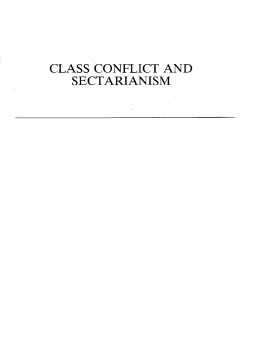
Additional Information
Book Details
Abstract
Belfast's Protestant working class has raised numerous problems for historians. Why should the most industrially developed part of Ireland, far from being the centre of conflict, have been what James Connolly called 'the happy hunting ground of the slave driver and the home of the least rebellious slaves in the industrial world'? Many observers have taken the Protestant working class to be dupes of the Orange Order, but in this important analysis of the effects of Orangeism and Unionism on Belfast's political life, Henry Patterson argues that the real strength of Orangeism lay not simply in its ability to suppress class antagonism but rather in its capacity to provide a specific form of expression of these antagonisms within the framework of traditional populist Orangeism.
Class Conflict and Sectarianism also considers the basis and significance of Unionist ideology of 'uneven development' and its relationship to the labour movement, providing new interpretations of the dispute between James Connolly and William Walker, the 1907 Dock Strike and the period of mass strikes and violent sectarianism in Belfast following the First World War.
'Patterson provides a vigorous challenge to some of the jaded cliches which have dominated Irish labour history's view of the North for so long.'
A.C. Hepburn, Irish Historical Studies
'An important contribution to the history of Ulster during the Union period.'
John Whyte, Interpreting Northern Ireland
